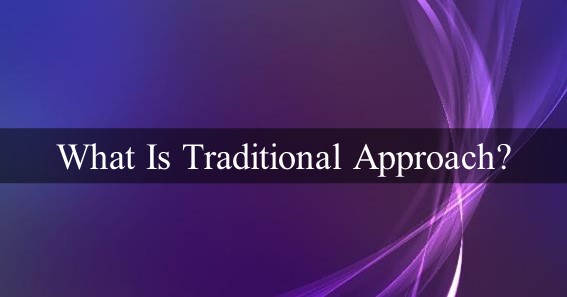Are you curious to know what is traditional approach? You have come to the right place as I am going to tell you everything about traditional approach in a very simple explanation. Without further discussion let’s begin to know what is traditional approach?
What Is Traditional Approach?
The traditional approach refers to a method of problem-solving or decision-making that has been used for a long time and is considered conventional or established. It is a method that has been tested over time and has been proven to be effective. In this blog post, we’ll take a closer look at the traditional approach, its characteristics, and its advantages and disadvantages.
Characteristics Of The Traditional Approach
The traditional approach is characterized by the following features:
- Linear Process: The traditional approach involves a step-by-step linear process that is followed to solve a problem or make a decision.
- Structured: The approach is structured and follows a predetermined set of rules and procedures.
- Tried And Tested: The traditional approach has been tried and tested over time and is considered reliable and effective.
- Historical: The traditional approach is often based on historical data or previous experiences.
Advantages Of The Traditional Approach
The traditional approach has several advantages, including:
- Reliability: The traditional approach is reliable and has been proven to be effective over time.
- Structured: The approach is structured, which makes it easy to follow and implement.
- Historical Data: The traditional approach is often based on historical data, which makes it a useful tool for decision-making.
- Consistency: The traditional approach is consistent, and the same method can be used repeatedly to solve similar problems.
Disadvantages Of The Traditional Approach
The traditional approach also has some disadvantages, including:
- Lack Of Flexibility: The traditional approach is often rigid and does not allow for flexibility or adaptation to new situations.
- Limited Creativity: The traditional approach does not encourage creativity and innovation.
- Inefficient: The traditional approach can be time-consuming and may not always be the most efficient method.
- Resistance To Change: The traditional approach can lead to resistance to change and may prevent new and innovative solutions from being considered.
Conclusion
In conclusion, the traditional approach is a method of problem-solving or decision-making that has been used for a long time and is considered conventional or established. The approach is characterized by a step-by-step linear process that is structured and based on historical data. The traditional approach has several advantages, including reliability, consistency, and historical data. However, it also has some disadvantages, such as a lack of flexibility and limited creativity. The traditional approach should be used judiciously, and organizations should be open to new and innovative solutions when appropriate.
FAQ
What Are The Types Of Traditional Approaches?
Accordingly, there are a large number of traditional approaches like legal approach, philosophical approach, historical approach, institutional approach, etc.
What Is The Traditional Approach To Politics?
The traditional approach involves the prescription and justification of political ideals or values, the historical description of governmental institutions and laws, and observations of actions and activities.
What Is The Traditional And Modern Approach?
The Traditional Approach distinguishes the accounts while the modern approach implements the accounting equation required for accounting. Under the traditional approach, the ledger accounts are then classified into – Personal and Impersonal accounts.
What Is The Traditional Approach And Its Characteristics?
Characteristics of Traditional approaches:
Traditional approaches are mostly normative and stress on the values of politics. Prominence is the study of different formal political structures. Traditional approaches made very little attempt to relate theory and research.
I Have Covered All The Following Queries And Topics In The Above Article
What Is A Downside Of Using The Traditional Waterfall Approach
What Is Traditional Approach
What Is The Downside Of Using The Traditional Waterfall Approach
What Is Downside Of Using The Traditional Waterfall Approach
Types Of Traditional Approach
What Is Traditional Approach In Teaching
What Is Traditional Approach In Human Development
What Is Traditional Approach In Accounting
What Is Traditional Approach In Marketing
What Is Traditional Approach In Political Science
What Is Traditional Approach In Financial Management
What Is Traditional Approach In Education
What Is Traditional Approach
What is the meaning of traditional approach
What is a traditional process?
